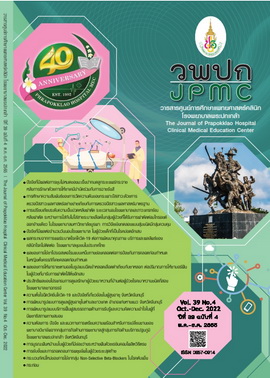Effectiveness of a Home Treatment Program on Patients with Type 2 Diabetes Mellitus in Khao Chakan Hospital
Main Article Content
Abstract
BACKGROUND: Chronic noncommunicable diseases are the most important global public health burden. From the overwhelming number of patients in hospital outpatient services, especially during the outbreak of the Coronavirus disease 2019 (COVID-19), the health service network in Khao Chakan district, Sa Kaeo province, Thailand developed a home treatment program for patients with type 2 diabetes mellitus (DM) to reduce the patient transfer and exposure, while maintaining the quality of medical care.
OBJECTIVE: To study the effectiveness of a home treatment program on the change of the blood sugar level, weight, waist circumference, and mean arterial blood pressure in patients with type 2 DM in Khao Chakan Hospital.
METHODS: The survey study included patients with type 2 DM in Khao Chakan district whose medications were home-delivered without an outpatient visit between April 1 to December 31, 2020. We compared the change of the blood sugar level, weight, waist circumference, and mean arterial blood pressure between the patients who voluntarily participated in the home treatment program and the patients who declined the program, and conducted a comparison before and after the home treatment program.
RESULTS: Nine hundred and fifty-one patients participated in the home treatment program, and 242 patients declined the program. Patients who participated in the program had a significantly lower change of blood sugar level and mean arterial blood pressure compared to those patients who did not (10.4 mg/dL and 1.8 mmHg, respectively; p<0.05). Furthermore, the outcomes were not different before and after the home treatment program in both groups.
CONCLUSIONS: The home treatment program was as effective as a routine outpatient hospital visit, and resulted in a lower change of the blood sugar level and mean arterial blood pressure compared to those who did not participate in the program.
Article Details

This work is licensed under a Creative Commons Attribution-NonCommercial-NoDerivatives 4.0 International License.
References
Association of Thai NCD Alliance. Association of Thai NCD alliance opposition to approve e-cigarettes as a legal product [Internet]. 2021[cited 2022 Sep 26]. Available from: https://www.hfocus.org/content/2021/10/23412
Ministry of Public Health. Non communicable diseases data [Internet]. Nonthaburi: Division of Non Communicable Diseases; 2020 [cited 2022 Sep 26]. Available from: http://www.thaincd.com/document/file/download/knowledge/รายงานสถานการณ์โรคNCDs63update.pdf
Ministry of Public Health. Guidelines for primary care cluster operations for health service [Internet]. Nonthaburi: Health Administration Division; 2016.[cited 2022 Sep 26] Available from: http://www.amno.moph.go.th/amno_new/files/Manual%20PCC%202017(1).pdf
Royal Thai. Announcements and orders of the center for management of the epidemic of Coronavirus Disease 2019 (COVID-19). [Internet]. 2022 [cited 2022 Sep 26]. Available from https://media.thaigov.go.th/uploads/document/66/2022/07/PDF/Doc_20220727202731000000.PDF
Ministry of Public Health. Manual for family health volunteers, care group for patients with chronic non-communicable diseases (NCDs) [Internet]. Nonthaburi: Department of Health Service Support; 2017. Available from: http://phc.moph.go.th/www_hss/data_center/dyn_mod/NCDs.pdf
Ministry of Public Health. Manual on participatory learning management on non-communicable diseases (NCDs) [Internet]. Nonthaburi: Division of Non Communicable Diseases.; 2019. [cited 2021 Sep 20]. Available from: http://www.thaincd.com/images/ปก/คู่มือการจัดการเรียนรู้อย่างมีส่วนร่วม63.pdf
Ministry of Public Health. Long term care manual for family care team [Internet]. Nonthaburi: Health Administration Division; 2016.[cited 2021 Sep 20]. Available from: https://www.rama.mahidol.ac.th/ramacme/sites/default/files/public/Family%20Doctor-01.pdf?fbclid=IwAR3fov5kWqWO6uKZ3ieZQy8C0rq_N8Z4JtVaarsbNWl80-bZrxwD-1MhyHQ
Nakrukarnphonphatn S, Suwannakoot N, Natason A. Experienced of village health volunteers to take care for patients in the community. Journal of Science and Technology, Ubon Ratchathani University 2019; 21(1):109-16.
Praogasil O, Wattana C, Tharavanij T. Effects of promoting self-efficacy in a self-management program on self-management behaviors, obesity, cardiovascular disease risk, and regression of metabolic syndrome, among persons with metabolic syndrome. Nursing Journal 2013;40(1):34-48.
Brey Z, Mash R, Goliath C, Roman D. Home delivery of medication during Coronavirus disease 2019, Cape Town, South Africa: Short report. Afr J Prim Health Care Fam Med[Internet]. 2020 [cited 2021 Sep 20];12(1):e1-e4. Available from: https://www.ncbi.nlm.nih.gov/pmc/articles/PMC7284162/pdf/PHCFM-12-2449.pdf
AlAbbasi HK, Thorakkattil SA, Mohiuddin SI, Nemr HS, Jabbour R, Al-Ghamdi F. Implementation and effectiveness of drive- through medication pick-up and home delivery services. A patient safety initiative during COVID-19 pandemic. J Patient Saf Risk Manag 2021; 26:179-86.

